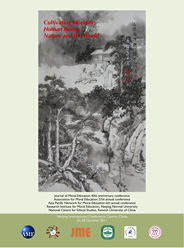Proposal submission is now closed!
As previously announced, please note that proposal submissions to the Nanjing 2011 conference website closed on 31st May.
The conference organisers thank all those who have made proposal submissions and are in the process of reviewing with the programme committee and responding to the over 270 proposal submitters in 37 countries. As one or two of us in opposite time zones are mainly responsible for sending out the letters of acceptance or requests for revision without any secretarial support please bear with us if you do not hear from us immediately but we intend to be in touch with everyone by mid-June.
Type of Presentation
Proposals in the following categories which promote discussion on these important issues, especially across cultural and disciplinary boundaries, are welcome:
- Individual papers: these are individually submitted proposals that will be grouped thematically or by discipline by the Programme Committee for 90-minute sessions; usually each presenter will be allowed 15-20 minutes presentation time; there will be discussion time after all the presentations; the Programme Committee will invite and assign a Chair for each session;
- Symposia: cross-cultural, cross-disciplinary or with a common topic or theme; organised by the submitter, who will typically be the session chair; usually symposia will have 3 or 4 presenters, maybe a discussant, but must also allow for interactive discussion with the audience over the 90-minute session;
- Roundtables: topics in the conference themes for discussion, possibly at meal times or during the evening: the organiser would take responsibility for making a presentation and leading an interactive discussion; roundtables might also include discussion of textbooks and other materials; programme introductions and practices; guidance on use of assessment methods;
- Poster presentations: on the conference themes, as well as theoretical, empirical and practical work in progress.
Proposal Submission
Proposal submission is now closed!
Proposals should be submitted in English in Microsoft Word via the Conference Website submission platform below:
- title;
- an abstract of 150 words, suitable for inclusion in the conference program;
- for individual submissions: an outline paper of 300 words indicating, as appropriate: the background context, literature, argument, research questions, methods, analysis, conclusions and implications for moral education and development;
- for symposia: a 300-word outline of each paper plus a 200-word rationale for the symposium as a whole;
- for roundtables: an outline of 300 words indicating the importance of the topic as related to the conference title or themes, an outline of the lead presentation and possibly that of a discussant;
- for posters: an outline of 200 words indicating the relevance of the topic to the conference themes and how it will be dealt with in work in progress;
- the category of presentation proposed;
- author(s) and institution(s) and full contact details of the corresponding proposer.
Proposals received after the due date cannot be assured full consideration.
By submitting a proposal it will be assumed that:
- if your proposal is accepted you are able and willing to participate fully in the conference and will make every effort to do so; and if this should prove impossible that you undertake to let the Programme Coordinators know at the earliest opportunity;
- unless clearly stated in the Notes section of the online submission template, you would be available to present at any time during the conference Monday 24th afternoon to Friday 28th October 2011 lunchtime;
- you will bring your paper on a memory stick to the conference and at least 10 copies for distribution at your presentation; bring your laptop if you intend to use PowerPoint.
Once you complete the Two Steps of the proposal submission, a confirmation page will be shown. You may be requested to provide more information or resubmit your proposal if your proposal is incomplete.
Proposers are limited to two submissions. If submitting more than one proposal please indicate the order of preference in case it is only possible to accommodate one.
Proposals will be considered by the NJ2011 Programme Committee which comprises: members of the Journal of Moral Education Editorial Board and its peer-review referee list, Association for Moral Education Board, The Asia-Pacific Network for Moral Education Committee, together with colleagues from the Research Institute for Moral Education, Nanjing Normal University and the National Centre for Ethical Studies, Renmin University of China, Beijing.
The Programme Committee plans to notify corresponding authors of its decisions by mid-June. The Committee's decision will be final.







